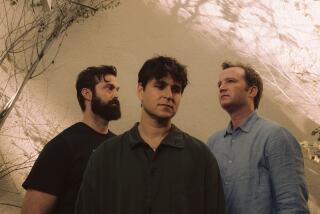Moving Beyond Darker Days : For Ex-Black Sabbath Drummer Bill Ward, a Rebirth in Mind, Music
ANAHEIM — When last heard from, in 1990, Bill Ward was stepping briskly toward the future and whistling along the way.
The footsteps and optimistic whistle were among the final sounds on “Ward One: Along the Way,” the first solo album by Ward, the founding drummer of Black Sabbath, one of the most controversial and influential bands in hard rock history.
The album told of a harrowing, near-fatal descent into alcoholism, and of a life-saving and soul-deepening swing toward recovery and self-knowledge. The story was Ward’s own, and “Along the Way” told it with a very good blend of hard-rock pounding, art-rock texture and intimate reflection.
It was tangible evidence of how far Ward had come from the awful but transformative day in 1983 when he sat in an alley in Huntington Beach with his mouth around the muzzle of a borrowed 12-gauge shotgun.
In a fairy tale world, people who hit bottom and find the will to recover get an exemption from further travail--happily ever after, the breaks even out and all that. In Ward’s world, the victory signaled by “Along the Way” soon was qualified by another round of troubles.
Ward’s record company, Chameleon, dropped him within a year of his album’s release, preventing it from getting the exposure it deserved. His marriage ended, with two young children involved. And he was dogged by agoraphobia, the potentially debilitating mental illness that makes people afraid to leave their homes.
But Ward--who in his Black Sabbath days (1968 to 1984) had used booze to quench his anger and dull his insecurity--now had ways to cope.
“It all came down bad in 1990. But you breathe in and out, and you just work through it,” he said last week, sitting in the sun outside a rehearsal studio, beside a small hill of instrument cases that he hopes to need soon to carry his music around the world--for the first time as a touring solo artist.
A Seal Beach resident who has lived in Orange County since the early 1980s, Ward did a lot more than breathe in and out over the past six years. He put together a band and wrote and recorded enough material for three albums--the first of which, “When the Bough Breaks,” will be released April 29 by Cleopatra Records, an independent label based in Los Angeles.
Now, he is on the verge of playing the first concert of his solo career, Wednesday at Club 369 in Fullerton. For the first time since he was 15 years old and fronting the Rest, a blues band in his hometown of Birmingham, England, Ward--now nearly 49--will get up and sing for a crowd of music fans.
In his downward-spiraling days, the idea of performing terrified Ward. “Touring seemed like a real scary thing” during the early ‘80s, he recalled. “I feel [those old fears] are not a threat in my life today. I’m active, I go everywhere, I fly. Little by little things have gotten better in my life, to the point where we’re [going to be] out touring.”
He is a solidly built man with a full, block-shaped, workingman’s face dominated by intent, clear-blue eyes. His soft-spoken manner is devoid of the bluster or self-absorption one might assume would come from one of the founding forces of heavy metal music.
Indeed, people who know Ward are struck by his gentle, low-keyed lack of pretentiousness. Many of his songs come off as humble, sensitive, empathetic recapitulations of the hard-won lessons of experience.
“He’s a wonderful guy to work with,” says Mike Slarve, Ward’s business manager since the late ‘80s. “If all artists were as dependable and forthcoming as he is, life would be a lot easier out there for a lot of managers. He’s a good guy, a really sensitive person, a man of his word.”
*
Ward also is emerging as a fine, all-around creative force. “When the Bough Breaks” finds him singing with greater range and assurance than on his first album (in which he shared the singing with guest vocalists Ozzy Osbourne--his old Black Sabbath mate--and Jack Bruce, a Hall of Fame rocker from another vintage British band, Cream).
The melodies are consistently ear-catching, and the arrangements are ambitiously festooned with wailing saxes, fiery female backing voices and stately keyboard and string parts. The material ranges from headlong ferocious to lullaby gentle, and in songs like “Please Help Mommy (She’s a Junkie),” Ward moves deftly between a hard, cutting edge and his trademark humane quality.
The album is a throwback to the era of albums like the Who’s “Who’s Next” and “Quadrophenia” and Jack Bruce’s “Songs for a Tailor,” when the point of rock wasn’t to fit into a marketing niche but to be a medium for exploring varied possibilities of feeling, storytelling and sonic architecture.
None of Ward’s new music sounds like Black Sabbath--even though this would be a highly opportune time for him to emphasize that connection: Sabbath’s glowering moods and pounding beats provide much of the foundation for today’s arena rock. The influence is crucial to the likes of Soundgarden, Smashing Pumpkins and White Zombie.
“I enjoy it, and it was a nice surprise,” Ward said of Sabbath’s impact on a new generation of bands over the past 10 years. “It’s a pleasant gift to see that there was some legacy there, that some of the things Sabbath did had been influential.”
But it’s not a legacy he wants to tap into himself at this point. “No, I play what’s in my heart at [any given] time. I’m not influenced by what’s popular or current. Whatever’s coming up inside of me is me. If I tried to falsify or fit in with current things, I’d be lying to myself.”
Black Sabbath fans will get more of a hard-rock taste of Ward in September when Cleopatra intends to release another new album, “Remembering,” which is almost complete. “ ‘Remembering’ is a little more rock,” Ward said. “It moves.”
*
Meanwhile, Ward has launched his own label, Mungus Shine Entertainment, to reissue “Ward One: Along the Way.” He foresees a two-disc package: the original recording, with its guest players, and a new version performed by his current band of musicians from L.A. (guitarists Keith Lynch and Spencer Sercombe, drummer Ronnie Ciago and bassist Paul Ill). Ward said Osbourne’s camp has refused him permission to reissue the two songs Ozzy sang on the 1990 release, so they will be deleted, and Ward will sing them on the remake.
Along with all that comes the challenge of remaking himself, in live performances, from a drummer to a singer-songwriter fronting his own band.
“I’ll probably invent something as I go,” he said. “I like to be spontaneous, so I have no preconceived notion of what to do. I simply want to sing and perform. Whatever the audience does, I’ll probably do the same. Hopefully, they won’t throw anything.”
Playing live again, Ward may have to face a contradiction between the humility he has sought in his life and emphasized in his songs, and the power that a strong rock band needs to become much larger than life as it sweeps up an audience with the music’s inherent force.
“I think it’s possible to perform and record with some humility,” Ward said. “I’m just hoping we can play, and at 48 I’m happy I can still do what it is I love doing. It can feel powerful. That can happen, but I don’t want to take advantage of that. I don’t want that to be some sort of sledgehammer. I don’t want to use that to bolster my ego. I’ve had enough problems with my ego in my life.”
* The Bill Ward Band, Strap and Daemon Cain play Wednesday at Club 369, 1641 N. Placentia Ave., Fullerton. 9 p.m. $5. (714) 572-1816.
More to Read
The biggest entertainment stories
Get our big stories about Hollywood, film, television, music, arts, culture and more right in your inbox as soon as they publish.
You may occasionally receive promotional content from the Los Angeles Times.











